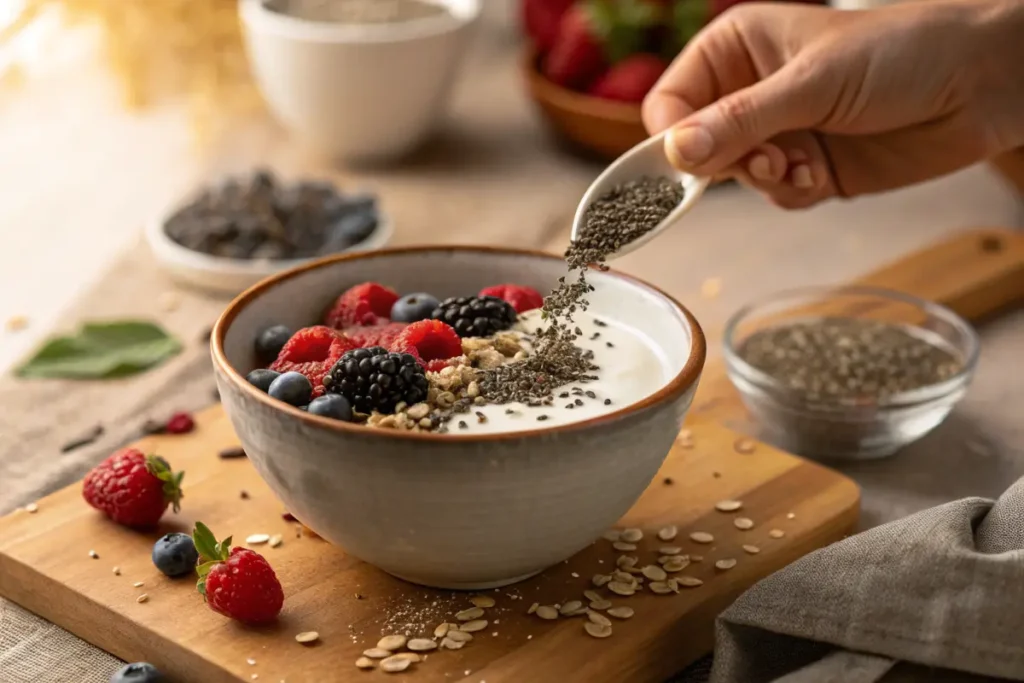Are you navigating the complexities of Polycystic Ovary Syndrome (PCOS) and wondering what the best breakfast choices are? You’re not alone! Many women with PCOS struggle to find the right foods to manage their symptoms and feel their best. This comprehensive guide aims to cut through the confusion and provide you with actionable advice on creating a nutritious and delicious breakfast routine. We’ll delve into understanding PCOS and its impact on your diet, highlight key nutritional principles, explore specific foods to embrace and avoid, and offer practical meal plans and recipes. Furthermore, we’ll discuss personalization, lifestyle factors, and frequently asked questions so you’ll have all the information you need. Let’s get started on your journey towards a healthier, happier you!
1: Understanding PCOS and Its Impact on Diet
What is PCOS?
First things first, let’s talk about what exactly PCOS is. Polycystic Ovary Syndrome is a common hormonal disorder that affects women of reproductive age. It’s characterized by irregular periods, excess androgens (male hormones), and/or polycystic ovaries. It can manifest differently in each person, causing a range of symptoms. These can include weight gain, acne, excess hair growth, and difficulty conceiving. It’s a complex condition, but understanding its underlying mechanisms is the first step in managing it effectively.
How PCOS Affects Insulin Resistance and Blood Sugar Levels
One of the major players in PCOS is insulin resistance. You see, when your body doesn’t respond to insulin properly, it can lead to higher blood sugar levels. Consequently, your body produces even more insulin to compensate. This excess insulin can, in turn, trigger the ovaries to produce more androgens, exacerbating PCOS symptoms. Therefore, controlling blood sugar levels through diet becomes paramount for women with PCOS. Managing this delicate balance is key in minimizing the impact of PCOS.
The Role of Diet in Managing PCOS Symptoms
Now, where does diet fit into all of this? Well, quite simply, diet plays a huge role in managing PCOS. In fact, what you eat can significantly impact your insulin levels, hormone balance, and overall health. By making informed food choices, you can actively help to alleviate many of the frustrating symptoms associated with PCOS. For example, focusing on low-GI foods and eating plenty of fiber will keep blood sugar stable.
Why Breakfast is Crucial for Women with PCOS
Why, you might ask, is breakfast so important for someone with PCOS? Well, breakfast sets the tone for the entire day. It helps stabilize your blood sugar after the overnight fast. Moreover, a nutritious breakfast can improve insulin sensitivity and curb cravings later on. Therefore, skipping breakfast or opting for a sugary meal can actually worsen PCOS symptoms, throwing your hormones and energy off. In short, choosing the best breakfast for someone with PCOS can make a world of difference. It’s a powerful tool in your PCOS management journey.
2: Key Nutritional Principles for a PCOS-Friendly Breakfast
Focusing on Low Glycemic Index (GI) Foods
Firstly, when thinking about what is the best breakfast for someone with PCOS, it’s vital to understand the glycemic index (GI). The GI basically measures how quickly a food raises your blood sugar. Therefore, choosing low-GI foods is key for those managing PCOS. These foods release sugar into the bloodstream slowly and steadily. Thus, this prevents those sudden spikes and crashes that can worsen insulin resistance. Examples include whole grains, non-starchy vegetables, and most fruits.
The Importance of Fiber in Managing PCOS
Next up, let’s talk about fiber. This crucial nutrient helps regulate blood sugar levels, making it especially beneficial for women with PCOS. In addition, fiber promotes satiety, meaning it helps you feel fuller for longer. Therefore, incorporating plenty of fiber into your breakfast can help with weight management, another common concern for those with PCOS. Think of things like oats, flaxseeds, and chia seeds, all loaded with that good stuff.
Prioritizing Lean Protein Sources
Another very important factor is protein. It’s essential for keeping you full, building muscle, and stabilizing your blood sugar. Consequently, a breakfast rich in lean protein is far more beneficial than one heavy on simple carbs. Good sources of lean protein include eggs, Greek yogurt, and nuts. Furthermore, including this macronutrient in your morning meal ensures you are starting your day with the right fuel.
The Benefits of Healthy Fats for Hormonal Balance
Moving on, let’s discuss healthy fats. These fats, contrary to popular belief, are actually really good for you, particularly for hormone balance. Indeed, things like avocados, nuts, and seeds provide essential fatty acids that can help regulate your hormones. Also, they help you absorb vital vitamins. So, don’t be afraid to add a sprinkle of nuts or a slice of avocado to your breakfast.
Minimizing Processed Foods and Added Sugars
Of course, on the flip side, you need to minimize processed foods and added sugars. These are often high in refined carbs and can cause big spikes in your blood sugar. Consequently, they can worsen insulin resistance and inflammation. Thus, steering clear of sugary cereals, pastries, and sweetened drinks is crucial when figuring out what is the best breakfast for someone with PCOS.
The Importance of Portion Control
Finally, let’s not forget portion control. Even with healthy foods, eating too much can throw off your blood sugar. Therefore, being mindful of your portions is key to maintaining healthy blood sugar levels and overall well-being. It is all about eating balanced portions of nutritious foods.
3: The Ideal PCOS Breakfast: Foods to Embrace
Eggs: A Versatile and Nutrient-Rich Option
First up, eggs are an all-star breakfast option, especially when considering what is the best breakfast for someone with PCOS. They’re packed with protein, vitamins, and minerals. Also, they’re incredibly versatile; you can scramble them, poach them, or make an omelet. Further, the choline and lutein found in eggs is great for overall health.
Greek Yogurt: Packed with Protein and Probiotics

Next, Greek yogurt is another fantastic choice, as it’s a powerhouse of protein and probiotics. Furthermore, probiotics can help support a healthy gut, which is also important for hormonal balance. It’s a great source of calcium too! Look for plain, unsweetened varieties to avoid added sugars. You can easily add your own natural sweetness with fruit.
Whole Grain Oats and Other High Fiber Alternatives
Then, whole grain oats are an excellent high-fiber option that provides sustained energy. However, understanding the difference between steel-cut, rolled, and instant oats is important. While all are oats, they have different processing methods that affect their glycemic index. Steel-cut oats, for example, are the least processed, and therefore have a lower GI than instant oats. Other high fiber alternatives include quinoa and barley.
Understanding the difference between steel cut, rolled and instant oats
As just mentioned, the type of oat makes a difference. Steel cut oats are the least processed form, with the lowest GI. Rolled oats are steamed and rolled, having a slightly higher GI, but are still great for you. Instant oats, due to processing, are higher GI, and less desirable for a PCOS friendly breakfast.
Nuts and Seeds: Sources of Healthy Fats and Fiber
Another terrific addition to a PCOS-friendly breakfast is nuts and seeds. These are packed with healthy fats, fiber, and protein, and are a great way to add a nutritional boost to any meal. Think almonds, walnuts, chia seeds, flaxseeds, and hemp seeds – all excellent choices. Therefore, a handful or a sprinkle will contribute to your satiety and nutritional intake.
Berries: Low-GI Fruits Rich in Antioxidants
Next, don’t forget about berries. These fruits are not only delicious but also low on the glycemic index, meaning they won’t spike your blood sugar. Moreover, they’re packed with antioxidants, which help fight inflammation. So, toss some blueberries, raspberries, or strawberries into your yogurt or oatmeal for a burst of flavor and nutrition.
Avocado: A Powerhouse of Healthy Fats
Also, avocado is another fantastic option, loaded with healthy fats and fiber. It can make your breakfast feel so much more satisfying! Spread it on some whole-grain toast, or add some to your smoothie for a creamy texture. Its good fats are wonderful for overall hormonal health.
Leafy Greens: Adding Essential Vitamins and Minerals
Finally, don’t forget those leafy greens. While they may seem unusual for breakfast, adding spinach or kale to your eggs or smoothie is an excellent way to boost your vitamin and mineral intake. Further, greens are also loaded with fiber, adding another level of goodness to your meal. So, don’t be shy about sneaking some greens into your morning routine!
These foods, when combined thoughtfully, can create the best breakfast for someone with PCOS, helping to manage symptoms and promote overall well-being.
4: Breakfast Foods to Avoid with PCOS
Sugary Cereals: The Pitfalls of Processed Grains
Firstly, let’s talk about why sugary cereals are a big no-no when considering what is the best breakfast for someone with PCOS. These cereals are often loaded with refined carbohydrates and added sugars, leading to a rapid spike in your blood sugar. Consequently, this spike can worsen insulin resistance, contributing to PCOS symptoms. Furthermore, they often lack the fiber and protein needed to keep you full, leaving you reaching for snacks soon after.
Pastries and Baked Goods: High in Refined Carbs and Sugar
Next, pastries and baked goods, such as muffins, donuts, and croissants, are another category to avoid. These treats are usually packed with refined carbs and sugar, offering little to no nutritional value. In addition, they tend to be high in unhealthy fats, which can further exacerbate inflammation. Indeed, these foods offer minimal benefit and a whole lot of potential issues for someone managing PCOS.
Sugary Drinks: The Hidden Source of Empty Calories
Also, don’t forget to consider sugary drinks. These drinks are often a sneaky source of empty calories and added sugars. From sweetened coffee drinks to fruit juices, these beverages can cause significant blood sugar spikes and contribute to weight gain. Furthermore, liquid calories often don’t register as filling, leading you to consume more without realizing it. Therefore, opt for water, herbal teas, or unsweetened alternatives instead.
High-Fat Processed Meats: Impact on Inflammation
Another area to be mindful of is high-fat processed meats, such as bacon and sausage. These meats can contribute to inflammation in the body and are often high in saturated fats. Therefore, they should be limited in your diet, particularly if you have PCOS. Instead, opt for lean protein sources.
Artificial Sweeteners and Additives
Lastly, be cautious with artificial sweeteners and additives. While they may seem like a calorie-free alternative to sugar, some studies suggest they can still impact blood sugar levels and gut health. Furthermore, these additives often do not provide any nutritional benefit. Thus, it’s best to stick with natural, whole foods as much as possible when looking for what is the best breakfast for someone with PCOS.
5: Example PCOS Breakfast Meal Plans and Recipes
Quick and Easy Breakfast Ideas for Busy Mornings
First off, let’s tackle quick and easy breakfast ideas for those busy mornings. Because, let’s be real, we don’t always have a lot of time!
Scrambled Eggs with Spinach and Avocado

One fantastic option is scrambled eggs with spinach and avocado. It’s a protein-packed, nutrient-rich breakfast that takes just minutes to prepare. Furthermore, adding spinach boosts your vitamin intake, while avocado offers healthy fats.
Overnight Oats with Berries and Nuts
Another great choice is overnight oats with berries and nuts. This can be prepared the night before. In the morning, simply add your toppings. These oats are loaded with fiber and healthy fats.
Greek Yogurt with Chia Seeds and a sprinkle of cinnamon
Finally, Greek yogurt with chia seeds and a sprinkle of cinnamon is super quick, easy, and packed with protein, probiotics, and fiber. Moreover, cinnamon adds a touch of natural sweetness and can aid in blood sugar control.
More Elaborate Breakfast Options for Weekends
Now, for those weekends when you have a little more time, let’s explore some more elaborate options.
Whole-Wheat Pancakes with Berries and a dollop of Greek yogurt
Whole-wheat pancakes with berries and a dollop of Greek yogurt are a delicious and satisfying option. Use whole-wheat flour to increase fiber content. Furthermore, adding berries gives you those all-important antioxidants.
Savory Breakfast Bowl with Lentils, Avocado and a Poached Egg
A savory breakfast bowl with lentils, avocado, and a poached egg is another fantastic option, offering a balanced blend of complex carbs, healthy fats, and protein. This is a more substantial meal, perfect for keeping you full and energized through a long morning.
Frittata loaded with Veggies and feta
Lastly, a frittata loaded with veggies and feta is a great way to get in your veggies and protein, all in one go. It’s easily customizable to use whatever vegetables you have on hand.
Recipe: High Protein Breakfast Smoothie For PCOS
For those who prefer a quick drink, here is a delicious, high-protein smoothie:
Ingredients:
- 1 cup unsweetened almond milk
- 1 scoop of protein powder (whey or plant-based)
- 1/2 cup frozen berries
- 1/4 avocado
- 1 tbsp chia seeds
- A handful of spinach
Instructions:
Combine all ingredients in a blender. Blend until smooth. Enjoy immediately!
6: How to Personalize Your PCOS Breakfast
Considering Your Individual Needs and Preferences
First and foremost, when figuring out what is the best breakfast for someone with PCOS, it’s really important to remember that everyone is different. What works wonders for one person might not work as well for another. Therefore, you should always take your individual needs and preferences into account. For example, you might have specific food sensitivities or intolerances that you need to consider. Also, your activity level and lifestyle will play a role in your nutritional needs. Thus, tailor your breakfast to suit your own unique situation.
Tracking Your Blood Sugar Levels to Monitor Food Response
Next up, consider tracking your blood sugar levels to monitor how your body responds to different foods. A blood glucose meter can be your best friend here. By checking your blood sugar before and after meals, you can identify which foods cause spikes and which ones keep your levels stable. Consequently, this data can be invaluable in helping you make the right breakfast choices. Monitoring will also guide you in better understanding what truly works for you.
Consulting with a Registered Dietitian or Nutritionist
Additionally, don’t hesitate to seek professional advice. Consulting with a registered dietitian or nutritionist who specializes in PCOS can be incredibly beneficial. They can provide personalized recommendations and help you create a meal plan that is specifically tailored to your needs. Moreover, they can answer any specific questions you might have about managing your condition through diet.
Experimenting and Finding What Works Best for You
Finally, remember that finding the best breakfast for someone with PCOS is a journey. It involves experimenting and finding what works best for you. So, don’t be afraid to try different foods, recipes, and meal timing. Keep a food diary, note how you feel, and adjust as needed. It’s all about being patient and tuning into what your body is telling you. Ultimately, you will find what helps you to feel your best.
7: Lifestyle Factors Supporting a Healthy Breakfast for PCOS
The Importance of Regular Exercise for Insulin Sensitivity
First and foremost, let’s acknowledge the role of regular exercise. It’s a crucial component of managing PCOS and works hand-in-hand with a healthy diet. Indeed, regular physical activity can significantly improve insulin sensitivity, making it easier for your body to regulate blood sugar. Therefore, aim for a mix of cardio and strength training throughout the week to maximize these benefits. It makes all the difference.
Getting Adequate Sleep for Hormonal Balance
Furthermore, don’t underestimate the power of adequate sleep. A lack of sleep can wreak havoc on your hormones, potentially worsening PCOS symptoms. Conversely, getting enough good-quality sleep can help regulate your hormones and improve overall well-being. Therefore, prioritize getting 7-9 hours of sleep each night.
Managing Stress Levels to Support Overall Health
Also, managing stress levels is another key factor in PCOS management. Chronic stress can lead to an increase in cortisol, which can further disrupt hormonal balance. Consequently, practicing stress-reducing activities like yoga, meditation, or spending time in nature can be really beneficial. Remember to find healthy coping mechanisms that work best for you.
Combining a Healthy Breakfast with a Balanced Eating Pattern throughout the Day
Finally, keep in mind that the best breakfast for someone with PCOS is just one part of a bigger picture. It’s essential to combine your healthy breakfast with a balanced eating pattern throughout the day. Focus on whole, unprocessed foods, and avoid long periods without eating. Therefore, make sure to nourish your body with healthy meals and snacks throughout the entire day.
8: FAQs: Commonly Asked Questions about the Best Breakfast for PCOS
What are some quick and healthy breakfast ideas for PCOS?
Many women wonder, what is the best breakfast for someone with PCOS? that is also quick and easy? Well, some great options include Greek yogurt with berries and nuts, a protein smoothie with spinach and avocado, or scrambled eggs with some whole-wheat toast. Therefore, these options provide a balance of protein, healthy fats, and fiber, setting you up for a great day. Furthermore, they require very little prep time.
Can I still have coffee with PCOS?
The question of coffee often comes up. While coffee itself isn’t inherently bad for PCOS, it’s the additions that can cause issues. Therefore, it is best to avoid sugary syrups and creamers. Black coffee or coffee with a splash of unsweetened milk or a natural sweetener should be fine for most. However, pay attention to how your body responds, as caffeine affects people differently.
How do I deal with breakfast cravings while trying to eat healthy with PCOS?
Dealing with breakfast cravings is a common struggle. The key is to listen to your body, but also understand the difference between true hunger and cravings. Therefore, if you are craving something sweet, try adding berries or a dash of cinnamon to your breakfast. Furthermore, ensuring you are including enough protein and fiber in your breakfast will help to keep you full and reduce cravings.
Is it necessary to follow a gluten-free or dairy-free diet with PCOS?
Lastly, many wonder if they should go gluten-free or dairy-free. While it isn’t mandatory for everyone, some women with PCOS may find that they feel better when they avoid gluten or dairy. This can be due to sensitivities, allergies or inflammation in the gut. Therefore, consider experimenting under the guidance of a dietitian or nutritionist to determine if a gluten-free or dairy-free diet is right for you.
9: Conclusion: Embracing a Nourishing Breakfast for PCOS
Recap of Key Points and Takeaways
To sum up, crafting the best breakfast for someone with PCOS involves focusing on low-GI foods, prioritizing lean protein and healthy fats, and avoiding refined carbs and added sugars. Moreover, choosing whole, unprocessed foods, and listening to your individual needs is paramount. Remember, a balanced diet, combined with regular exercise, adequate sleep, and stress management, are the keys to managing PCOS effectively.
The Long-Term Benefits of Prioritizing a Healthy PCOS Breakfast
Finally, know that prioritizing a healthy PCOS breakfast isn’t just about managing symptoms in the short term. In fact, it’s about making a long-term investment in your overall health and well-being. Embracing a nourishing breakfast routine can improve your energy levels, mood, hormonal balance, and overall quality of life. Therefore, take the time to make breakfast a positive and empowering part of your day!

